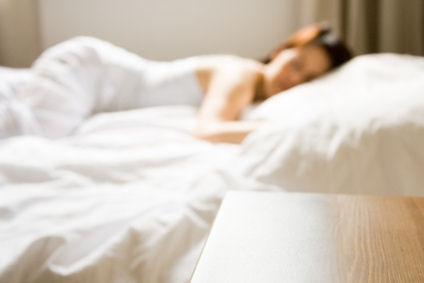Sleep apnoea is very common, but less than one in four sufferers are diagnosed. Although sleep apnoea can affect men and women of all ages, it’s most common in middle-aged men, affecting about one in 25, according to the Sleep Apnoea Trust.
Sleep apnoea causes daytime sleepiness that can seriously affect people’s work and social lives, and their ability to drive safely.
What is sleep apnoea?
Sleep apnoea is when the throat narrows or closes during sleep and repeatedly interrupts your breathing.
This results in a fall in the blood’s oxygen levels. The difficulty in breathing causes the brain to wake you up.
This can happen hundreds of times a night without you realising. It leads to poor sleep quality and severe sleepiness during the day.
The good news is that something can be done if you’re diagnosed with sleep apnoea.
Symptoms of sleep apnoea
You may not be aware that you have problems breathing while asleep. Often it’s a partner or a family member that notices.
However, you may notice these symptoms:
snoring
episodes during sleep where you stop breathing
restless/unrefreshing sleep
frequent trips to the toilet every night
morning headaches
excessive daytime sleepiness and irritability
poor concentration
Overweight men aged between 30 and 65 are most likely to have it. Sleep apnoea appears to be less common in women.
Sleep apnoea also affects children, particularly if they have enlarged tonsils or adenoids.
Health risks of sleep apnoea
If left untreated, the condition can increase the risks of high blood pressure, coronary heart disease, stroke and diabetes.
People with sleep apnoea are significantly more likely to have a road accident than other people.
Tests show that drivers who are sleepy due to sleep apnoea perform worse than drivers with blood alcohol levels over the legal drink drive limit.
Read how Terry, who has sleep apnoea, fell asleep while driving.
Diagnosing sleep apnoea
Most people who have sleep apnoea can be diagnosed by doing a home recording. Recorders are available from special sleep clinics, and can be worn overnight in bed.
These measure either just the blood oxygen level, or oxygen plus snoring, heart rate and breathing using sensors.
See more about diagnosing sleep apnoea.
Treating sleep apnoea
If you are diagnosed with sleep apnoea, you’re likely to be prescribed continuous positive airways pressure (CPAP).
This is where you wear a mask over your nose and mouth, and a machine raises and regulates the pressure of the air you breathe in. This prevents your airway from collapsing during sleep.
CPAP has good results. By controlling the apnoea, it improves sleep quality. You’re more likely to wake up feeling refreshed, and stay alert throughout the day.
CPAP also suppresses the snoring, meaning that your partner can sleep better too.
